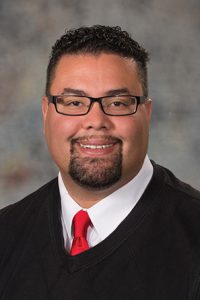Omnibus criminal justice reform bill advanced to final round after cloture
A bill that would enact a variety of criminal justice programs and other reforms was amended and advanced from select file May 24 following a successful cloture vote.

LB50, originally introduced by former Lincoln Sen. Suzanne Geist, would create several programs to improve the state’s criminal justice system, including a program to expand problem-solving courts, a pilot program to establish parole-violation residential housing and creation of a probationer incentive program.
As amended on general file, the bill also includes provisions of nearly a dozen additional measures, including Omaha Sen. Justin Wayne’s LB352 related to habitual criminal enhancement and parole eligibility.
The provisions, which were the focus of contentious general file debate, would create a habitual criminal enhancement of a three-year mandatory minimum for a felony charge that does not include offenses relating to violence, firearms or sex crimes and would change parole eligibility.
The provisions would allow an offender to be eligible for parole consideration two years before mandatory discharge on a maximum sentence up to 12 years, three years before mandatory discharge on a maximum sentence up to 16 years, four years before mandatory discharge on a maximum sentence up to 20 years and five years before mandatory discharge on a maximum sentence of more than 20 years.
Wayne offered an amendment during select file debate that he called a “good-faith” compromise to address opponents’ concerns and help curb Nebraska’s prison overcrowding emergency.
The amendment would allow an offender who is serving a maximum sentence of 20 years to be parole eligible at least two years prior to their mandatory discharge date and would allow an offender who is serving a sentence over 20 years to be parole eligible after having served 80 percent of the term prior to their mandatory discharge date.
Under the amendment, the mandatory minimum term for a habitual offender would be three years and the maximum term would be no more than the maximum term given or twenty years — whichever is greater — for qualified offenders. Individuals who have committed offenses related to firearms, violence or sex crimes would be excluded from those provisions.
The amendment also would require that two criminal defense attorneys with at least 10 years experience be appointed by the governor to the Nebraska Sentencing Reform Task Force.
Wayne said the proposal had the support of the attorney general, the governor’s office and police unions. The amendment, he said, would give inmates a larger window in which to become parole eligible, which would address concerns over “jamming out” — a term used to describe when an offender exhausts their sentence without the opportunity for parole or supervision.
“One year doesn’t make a difference on a 20-year sentence, but one year being supervised makes … a difference,” Wayne said. “We have to supervise people on the back end.”
Lincoln Sen. Danielle Conrad spoke in support of the bill and the amendment, saying the changes would help to address Nebraska’s prison overcrowding crisis. Research shows that providing more reentry support reduces the likelihood that offenders will commit new crimes, she said, which would keep Nebraskans safer.
“Over 90 percent of [offenders] are going to return to our communities,” Conrad said. “When they return to our communities, they need to have hope. They need to have help.”
Bellevue Sen. Rick Holdcroft also spoke in support of the amendment and the underlying bill. Becoming parole eligible does not mean that an inmate automatically will be paroled, he said, and changing eligibility from 85 percent of a maximum sentence to 80 percent would not be substantial.
Several senators raised concern that the amendment was opposed by the county attorneys’ association.
Thurston Sen. Joni Albrecht spoke in opposition to the parole eligibility provision in the Wayne amendment, calling it a “substantial departure” from the state’s current sentencing requirements.
“This has the effect of making offenders parole eligible way before the mandatory discharge date and is essentially a reduction in [their] sentence,” Albrecht said. “These provisions would be retroactive and apply to offenders currently behind bars [and] would be disruptive to the victims who have settled with the expectation about the sentences and parole eligibility.”
The Wayne amendment was adopted 34-6.
Also during select file debate, Hastings Sen. Steve Halloran offered a motion to replace a floor amendment with provisions of Glenvil Sen. Dave Murman’s LB371, intended to prohibit minors under age 19 from attending drag shows in Nebraska.
Halloran said the state has a responsibility to protect minors from drag shows that he said often include “sexually inappropriate” behavior.
The motion failed on a vote of 6-32.
Sumner Sen. Teresa Ibach also offered a select file amendment, adopted 37-6, that includes provisions of four additional bills:
•LB14, introduced by Lincoln Sen. George Dungan, which would expand eligibility for the Young Adult Bridge to Independence program;
•LB220, introduced by Ibach, which would require the Board of Pardons to notify a victim whose name appears in the file of a convicted person of any pardon or commutation at least 30 days prior to those proceedings and within 10 days of the granting of a pardon or commutation;
•LB265, introduced by Gordon Sen. Tom Brewer, which would require the Nebraska Department of Correctional Services to provide stab-resistant protective vests to each corrections officer; and
•LB521, introduced by Fremont Sen. Lynne Walz, which would include school personnel in immunity provisions for administering naloxone to a person who is experiencing an opioid-related overdose.
After four hours of debate, Wayne offered a motion to invoke cloture, adopted 35-9, which ends debate and forces a vote on the bill and any pending amendments.
Following the successful cloture motion, lawmakers voted 30-7 to advance LB50 to the final round of debate.

